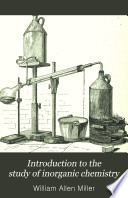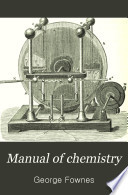 | George Fownes - 1845 - 498 pages
...The solution of this substance possesses, in the very highest degree, the properties termed alkaline; it restores the blue colour to litmus which has been reddened by an acid ; neutralizes completely the most powerful acids; has a nauseous and peculiar taste, and dissolves... | |
 | Sir Frederick Augustus Abel - 1854 - 700 pages
...inorganic base which is soluble in water ; it possesses a peculiar acrid taste, and is capable of restoring the blue colour to litmus which has been reddened by an acid, or of imparting a brown tint to turmeric paper. (Alkaline reaction.) § 12. A SALT is a combination... | |
 | George Fownes - 1857 - 576 pages
...solution of this substance possesses, in the very highest degree, the properties termed alkaline ; it restores the blue colour to litmus which has been reddened by an acid ; neutralizes completely the most powerful acids ; has a naseous and peculiar taste, and dissolves... | |
 | William Allen Miller - 1860 - 942 pages
...of a soapy, disagreeable taste, and a peculiar lixivial smell ; it has a caustic action on the skin, restores the blue colour to litmus which has been reddened by an acid, and it completely neutralizes the strongest acids. Other metals form oxides, which, though not soluble... | |
 | George Fownes - 1863 - 854 pages
...The solution of this substance possesses, in the very highest degree, the properties termed alkaline: it restores the blue colour to litmus which has been reddened by an acid ; neutralizes completely the most powerful adds j has u nauseous and peculiar taste, and dissolves... | |
 | Charles Loudon Bloxam - 1867 - 758 pages
...(Dp.F. — A mineral* alkali is a metallic oxide easily soluble in water, and capable of restoring the blue colour to litmus which has been reddened by an acid.) If some diluted sulphuric acid be added drop by drop to a portion of the solution of soda, it will... | |
 | William Allen Miller - 1871 - 312 pages
...soapy, disagreeable taste, and a peculiar lixivial smell. It corrodes the skin, dissolves oil-paint, restores the blue colour to litmus which has been reddened by an acid, and neutralises the strongest acids. This power which acids and bases have of uniting with each other,... | |
 | Richard Dennis Hoblyn - 1878 - 752 pages
...in low-roofed mines. See House-maid's Knee. MINERAL ALKALI. A metallic oxide, capable of restoring the blue colour to litmus which has been reddened by an acid. MINERAL DEGENERATION. The deposition of mineral or earthy matters in various organs or morbid growths... | |
 | George Fownes - 1883 - 602 pages
...solution of this substance possesses, in the very highest degree, the properties termed alkaline : it restores the blue colour to litmus which has been reddened by an acid ; neutralises completely the most powerful acids ; has a nauseous and peculiar taste ; dissolves the... | |
 | Arthur Rigg - 1883 - 212 pages
...etc. The second class, termed basic oxides, unite with water to form hydrates, bodies which restore the blue colour to litmus which has been reddened by an acid ; such are the oxides of potassium, sodium, calcium, etc. The third class do not combine chemically... | |
| |